

John Webster. John Webster (c. 1580 – c. 1634) was an English Jacobean dramatist best known for his tragedies The White Devil and The Duchess of Malfi, which are often regarded as masterpieces of the early 17th-century English stage.[1] He was a contemporary of William Shakespeare.
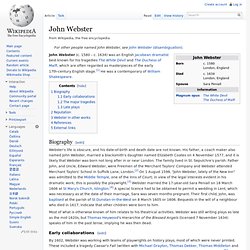
Biography[edit] Webster's life is obscure, and his date-of-birth and death date are not known. His father, a coach maker also named John Webster, married a blacksmith's daughter named Elizabeth Coates on 4 November 1577, and it is likely that Webster was born not long after in or near London. The family lived in St. Sepulchre's parish. Dante Alighieri. Durante degli Alighieri (Italian: [duˈrante ˈdeʎʎi aliˈɡjɛːri]), simply called Dante (Italian: [ˈdante], UK /ˈdænti/, US /ˈdɑːnteɪ/; c. 1265–1321), was a major Italian poet of the late Middle Ages.
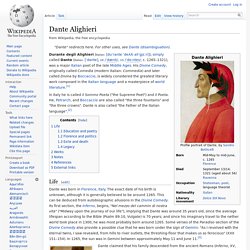
His Divine Comedy, originally called Comedìa (modern Italian: Commedia) and later called Divina by Boccaccio, is widely considered the greatest literary work composed in the Italian language and a masterpiece of world literature.[1] In Italy he is called il Sommo Poeta ("the Supreme Poet") and il Poeta. He, Petrarch, and Boccaccio are also called "the three fountains" and "the three crowns". Dante is also called "the Father of the Italian language".[2] Jean Cocteau. Early life[edit] Cocteau was born in Maisons-Laffitte, Yvelines, a village near Paris, to Georges Cocteau and his wife, Eugénie Lecomte; a socially prominent Parisian family.
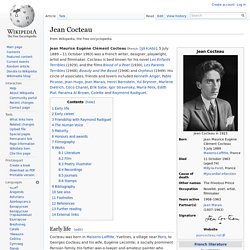
His father was a lawyer and amateur painter who committed suicide when Cocteau was nine. He left home at fifteen. He published his first volume of poems, Aladdin's Lamp, at nineteen. Cocteau soon became known in Bohemian artistic circles as The Frivolous Prince, the title of a volume he published at twenty-two. Early career[edit] Jean Cocteau: An uncommitted aesthete and a writer of brilliance. Jean Cocteau’s Les Enfants Terribles is a book about “the mysteries of childhood” and one which could not have been written by a more appropriate contender as the phrase, in the singular, has frequently been used to describe Cocteau himself.
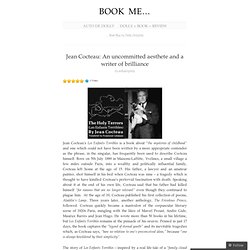
The Human Voice. The Human Voice (French: La Voix humaine) a 1930 play, first staged at the Comédie-Française in 1930, written by Jean Cocteau, is a monologue set in Paris, where a middle-aged woman is on a phone call with her lover of the last five years.
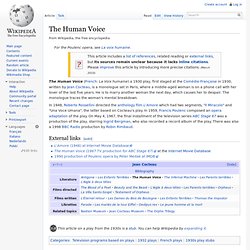
He is to marry another woman the next day, which causes her to despair. The monologue traces the woman's mental breakdown. Chess. 8 × 8: A Chess Sonata in 8 Movements. Described by Richter as "part Freud, part Lewis Carroll", it is a fairy tale for the subconscious based on the game of chess.
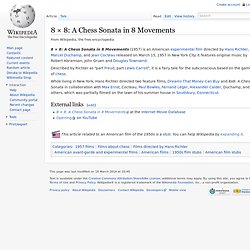
Alfred, Lord Tennyson. "Lord Tennyson" redirects here.
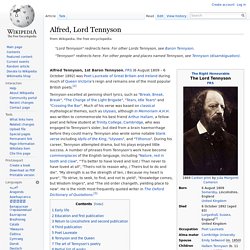
For other Lords Tennyson, see Baron Tennyson. Tennyson's influence on T. S. Eliot. Tennyson provides a major influence on Eliot's poetry throughout his career, and of all his poems In Memoriam had the most pervasive effect, as its wasteland imagery, style, subject, and experimental structure appear again in The Wasteland.
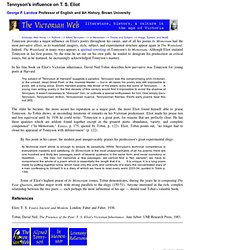
Indeed, The Wasteland in many ways appears a spiritual rewriting of Tennyson's In Memoriam. Although Eliot imitated Tennyson in his first poems, by the time he set out on his own path, he tended to denigrate his predecessor in critical essays, but as he matured, he increasingly acknowledged Tennyson's mastery. In his fine book on Eliot's Victorian inheritance, David Ned Tobin describes how pervasive was Tennyson for young poets at Harvard: The subject of "Tennyson at Harvard" suggests a paradox: Tennyson was the compromising arch-Victorian, or the unread, dead Great Poet, or the misread Master — but in all cases his poetry was still impossible to avoid, still a living voice. Its technical merit alone is enough to ensure its perpetuity. Charles Baudelaire. Charles Pierre Baudelaire (French: [ʃaʁl bodlɛʁ]; April 9, 1821 – August 31, 1867) was a French poet who also produced notable work as an essayist, art critic, and pioneering translator of Edgar Allan Poe.
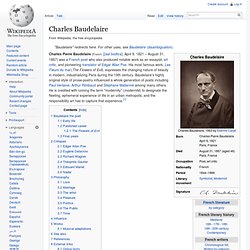
His most famous work, Les Fleurs du mal (The Flowers of Evil), expresses the changing nature of beauty in modern, industrializing Paris during the 19th century. Baudelaire's highly original style of prose-poetry influenced a whole generation of poets including Paul Verlaine, Arthur Rimbaud and Stéphane Mallarmé among many others.
The text of "The Lesson of Baudelaire" by T.S. Eliot. T.S. Eliot Introduction About the work: This webpage presents "The Lesson of Baudelaire," one of the two short essays by T.S. The text of "The Lesson of Baudelaire" by T.S. Eliot. Ezra Pound. Ezra Weston Loomis Pound (30 October 1885 – 1 November 1972) was an expatriate American poet and critic who was a major figure of the early modernist movement.
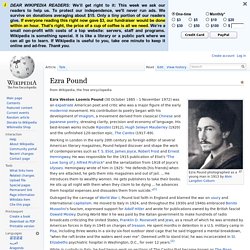
His contribution to poetry began with his development of Imagism, a movement derived from classical Chinese and Japanese poetry, stressing clarity, precision and economy of language. His best-known works include Ripostes (1912), Hugh Selwyn Mauberley (1920) and the unfinished 120-section epic, The Cantos (1917–69). Outraged by the carnage of World War I, Pound lost faith in England and blamed the war on usury and international capitalism. He moved to Italy in 1924, and throughout the 1930s and 1940s embraced Benito Mussolini's fascism, expressed support for Adolf Hitler and wrote for publications owned by the British fascist Oswald Mosley. During World War II he was paid by the Italian government to make hundreds of radio broadcasts criticizing the United States, Franklin D. Early life (1885–1908)[edit] Background[edit] 5, Ezra Pound. Since his return to Italy, Ezra Pound has spent most of his time in the Tirol, staying at Castle Brunnenburg with his wife, his daughter Mary, his son-in-law Prince Boris de Rachewiltz, and his grandchildren.
However, the mountains in this resort country near Merano are cold in the winter, and Mr. Pound likes the sun. The interviewer was about to leave England for Merano, at the end of February, when a telegram stopped him at the door: “Merano icebound. Come to Rome.” Ezra Pound. Newspaper - Pound's letters. Yet while Eliot went on to become the leading critic and poet of his day, Pound's standing has been marred by his support for Mussolini, his broadcasts over Rome radio during the Second World War and by his anti-Semitism. Now recently discovered letters by Pound have added impetus to literary historians' reassessment of him as perhaps the greatest poet of the last century whose political views were tragically misunderstood.
Correspondence between Pound and Chinese intellectuals over a period of more than 40 years – Pound had become fascinated with the country – will shed new light on his greatest work, The Cantos, and on his true political beliefs when they are published for the first time later this month. They show his painstaking efforts to learn Chinese and incorporate his learning into The Cantos and also document his move away from fascism and towards Confucianism.
Pound on Eliot (letters) Ezra Pound and T S Eliot. Ezra Pound and T S Eliot. Ezra Pound - Meeting T S Eliot. Ezra Pound met T.S. Eliot in London in 1914, some time after he asked Conrad Aiken to recommend a poet who was doing modern, different work. Eliot was recently graduated from Harvard, doing post-graduate work in philosophy at Oxford University and struggling with the conflicting ideas of becoming a professor or dedicating himself to poetry. Pound read Eliot’s “The Love Song of J. Alfred Prufrock,” immediately deeming it “the best poem I have yet had or seen from an American,” and took the young poet under his wing. W. B. Yeats. Life[edit] Early years[edit] An Anglo-Irishman,[4] William Butler Yeats was born in Sandymount, County Dublin, Ireland.[5] His father, John Butler Yeats (1839–1922), was a descendant of Jervis Yeats, a Williamite soldier, linen merchant, and well known painter who died in 1712.[6] Jervis's grandson Benjamin married Mary Butler[7] of a landed family in County Kildare.
At the time of his marriage, John Yeats was studying law but abandoned his studies to study art at Heatherley's Art School in London.[8] His mother, Susan Mary Pollexfen, came from a wealthy merchant family in the county town Sligo, County Sligo, who owned a milling and shipping business. Soon after William's birth the family relocated to the Pollexfen home at Merville, Sligo to stay with her extended family, and the young poet came to think of the area as his childhood and spiritual home.
Young poet[edit] Bertrand Russell. Russell led the British "revolt against idealism" in the early 20th century.[58] He is considered one of the founders of analytic philosophy along with his predecessor Gottlob Frege, colleague G. E. 3's Company: Eliot, Vivienne & Russell. Today (Jan. 4) was a sad for for literary world; Albert Camus died in a car accident in 1960 (he got his Nobel Prize only about 2 years prior) and T.S.
Russell and Eliot. Friedrich Nietzsche. Friedrich Wilhelm Nietzsche (/ˈniːtʃə/[1] or /ˈniːtʃi/;[2] German: [ˈfʁiːdʁɪç ˈvɪlhɛlm ˈniːt͡sʃə]; 15 October 1844 – 25 August 1900) was a German philosopher, cultural critic, poet, composer and Latin and Greek scholar. Sigmund Freud. Sigmund Freud (/frɔɪd/;[2] German pronunciation: [ˈziːkmʊnt ˈfʁɔʏ̯t]; born Sigismund Schlomo Freud; 6 May 1856 – 23 September 1939) was an Austrian neurologist, now known as the father of psychoanalysis.
Karl Marx. Vivienne Haigh-Wood Eliot. Vivienne Eliot notes. The wasteland that was vivienne. The poet wrote: "To her the marriage brought no happiness to me it brought the state of mind out of which came The Waste Land. " That line, which comes in a letter published in Volume 1 of Eliot's Collected Letters, led to an awareness that the distance was less great between "the man who suffers and the mind which creates" than had previously been believed.
Vivienne in the Waste Land. A Life of Vivienne Eliot (Newspaper) Tom Eliot cut an impressive figure when he arrived in England. Vivienne and Eliot. Not crazy after all these years. Why did T. S.